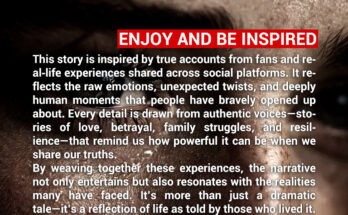I’m Carley, twenty, and my life was built around my grandfather after my parents walked away when I was born. He told me my parents had chosen not to keep me, and for years that version of events was everything I knew. Grandpa and Grandma formally adopted me; Grandma died when I was little, leaving Grandpa as my anchor and protector. He filled my world with routines, stories, and stability. When he passed, he left me his house and savings. I grieved, inherited, and felt both gratitude and an odd emptiness—until my phone filled with furious messages from step-siblings demanding a share of what he left me.
My mom reached out after the initial storm. She didn’t ask for money at first; she told me something that cracked open my childhood certainty: Grandpa had intervened. She said my parents were young and struggling, living a carefree, hippy-ish life with little money, and that Grandpa had persuaded them it was better for me to stay with him until they were stable. She claimed they’d wanted me back a year later, but Grandpa refused and even went to court to make his custody permanent. He had money, influence, and a convincing story that painted them as unreliable—and the judge sided with him.
Hearing that, I felt like the rug had been pulled from under me. My entire identity—who my parents were, why I had been raised the way I was—suddenly looked like someone else’s edit of the truth. I kept replaying memories: Grandpa’s stories of my parents’ choices, the way he framed everything as their decision, not his. If my mom is telling the truth, then someone I loved and trusted made decisions that shaped my life without my consent. I felt betrayed, but also bewildered: why reveal this only now, after Grandpa is gone and I’ve inherited what he left?
The family pressure escalated fast. My mom and her relatives insisted Grandpa had tricked everyone and that I should “fix things” by handing over everything he left me. Step-siblings clamored, cousins messaged, and my inbox became a forum of entitlement and accusation. I felt torn. Part of me wanted to believe my mother’s newfound regret and to reach toward the family I never had. Another part suspected a convenient narrative: why resurface with this story the moment money and property transferred? I didn’t know whether I was being asked to heal wounds or to pay restitution for someone else’s manipulation.
I’m stuck between loyalty to the man who raised me and the possibility that he’d stolen my childhood from my parents. I want to know what really happened—court records, witnesses, proof—but truth feels slippery and heavy. I also worry about the consequences of either choice: give them the inheritance and lose the house and security Grandpa gave me; refuse and be labeled cold, selfish, or worse, complicit in a lie. All I’ve ever wanted is belonging, yet now every step toward connection feels like a step toward losing what little stability I have left.
So I’m cautious and scared. I don’t want to be cruel to my mother if she truly wanted me back. I also can’t surrender the life my grandfather built for me without answers and a sense that I’m not being exploited. For now, I’m asking questions, requesting documents, and setting boundaries while I grieve both the man who raised me and the version of my family he sold me. I feel betrayed, confused, and painfully lonely—torn between love for Grandpa, curiosity about my parents, and the fear that no matter what I choose, someone I love will be hurt.


